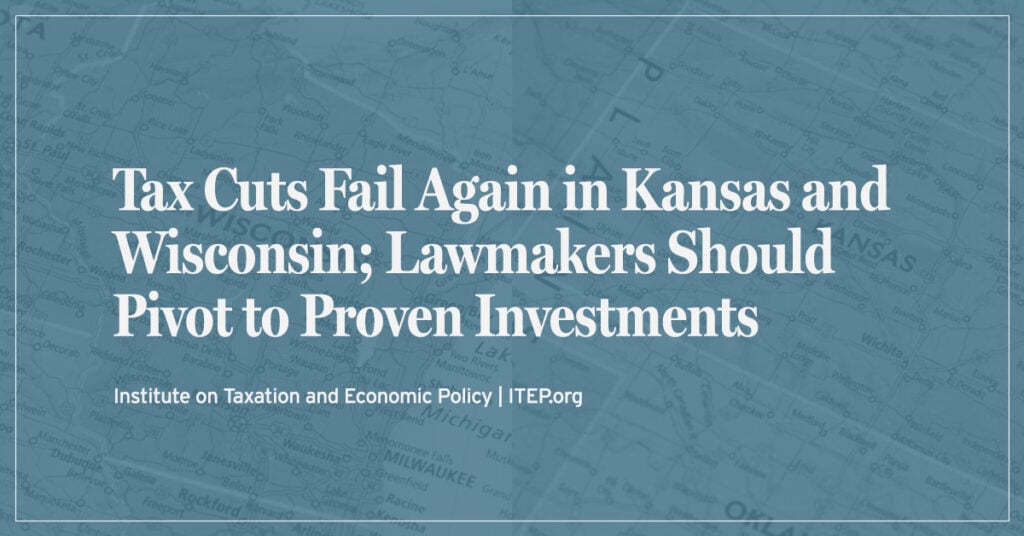Anti-tax interests finally found the end of the tax cutting appetite in a few states this week, as Wisconsin Gov. Tony Evers vetoed major income tax cuts, Michigan courts ruled that a temporary pandemic-era income tax cut was indeed temporary, and South Dakota lawmakers also affirmed the temporary nature of a recent sales tax cut there. That won’t stop those interests from working to entrench anti-tax measures where they can, however, as evidenced by the passage of a statutory income tax ban in Washington and efforts to constitutionally deter progressive tax increases in Iowa.
Major State Tax Proposals and Developments
- Gov. Tony Evers in WISCONSIN vetoed the three most expensive bills from the legislature’s Republican-backed tax cut package. The centerpiece of this package was an $800 million annual income tax cut that would have expanded the state’s second tax bracket of 4.4 percent to include higher incomes. Vetoed legislation also included an expanded retirement subtraction that would have allowed seniors to exempt up to $150,000 of retirement income from state income tax and an increase to the state’s credit for married filers. Collectively, the vetoed bills would have cost the state an annual revenue loss of $1.9 billion. Gov. Evers signed the fourth bill in the package which expanded the state’s childcare credit (a nonrefundable child and dependent care credit), but also urged legislators to invest further in childcare. – NEVA BUTKUS
State Roundup
- A push for a state child tax credit in CONNECTICUT is gaining steam. The credit would provide $600 a year per child and is projected to impact 75 percent of families in the state.
- DELAWARE Republican lawmakers are pushing several tax proposals this year, ranging from business tax credits to a cut to the state’s existing Real Estate Transfer tax.
- HAWAII lawmakers appear likely to pass a $25 “tourist tax” to fund climate change mitigation efforts.
- IDAHO Gov. Brad Little signed into law a bill that will cut unemployment insurance taxes by assigning a taxable wage rate based on class of employer for a fiscal year.
- House and Senate Subcommittees in IOWA have advanced bills calling for a constitutional amendment that would require a supermajority to raise taxes and enshrine a flat tax in the state’s constitution.
- MASSACHUSETTS Gov. Maura Healey introduced a bill that will give cities and towns the ability to raise certain taxes.
- MICHIGAN’s temporary income tax cut from 4.25 percent to 4.05 percent will expire after this year, after a judge reaffirmed the decision. The income tax rate will return to its previous 4.25 percent, due to that court decision and the general fund growing slower than inflation. In other news, Gov. Gretchen Whitmer proposed a $5,000 credit for those who care for elderly or disabled relatives.
- The city of St. Paul, MINNESOTA, will vote on a property tax increase this November to create a childcare subsidy fund.
- MONTANA Republicans on the House Economic Affairs Interim Committee voted down a proposal for a committee aimed at addressing childcare affordability through things like a child tax credit and other credits for childcare workers.
- NEW JERSEY lawmakers are pushing a new infrastructure plan that includes increasing the gas tax 1.9 cents per gallon annually for five years and enacting a yearly fee on electric vehicles.
- The PENNSYLVANIA House Finance Subcommittee on Tax Modernization and Reform held a hearing last Friday about the “Fair Share Tax Plan” that would decrease the personal income tax on wages and interest and increase the tax on passive income from wealth; the proposal would help reduce the regressivity of the state’s tax code.
- In the RHODE ISLAND legislature, there were two tax bills introduced. One bill would create a new tax-advantaged savings account for home down payments, and the other would levy a tax on would-be corporate buyers of single-family homes.
- In SOUTH DAKOTA, the State Senate voted by a wide margin to maintain the temporary nature of last year’s reduction to the sales tax, rather than making the policy permanent. In 2023, the sales tax rate was reduced from 4.5 percent to 4.2 percent. It is set to return to its original rate in 2027.
- TENNESSEE State Senators advanced a bill that would provide up to $1.6 billion in immediate tax refunds to businesses and lead to a $410 million annual revenue loss to the state, by changing the state’s franchise tax calculation to remove the portion based on property value. Some, including Gov. Bill Lee, argue the state could be on the hook for such refunds if companies sue and courts find the tax’s calculation unconstitutional (the policy has been on the books since 1937), but others are pushing back on this approach, looking to avert the revenue loss, maintain the tax, and propose alternatives.
- WASHINGTON lawmakers enacted a citizen ballot initiative to ban state and local income taxes. A legal precedent already effectively prohibits state income tax, so the measure has no immediate effect, but could hamper efforts to address Washington’s severely regressive tax code in the future.
What We’re Reading
- The Trace counts seven states are currently looking into taxing guns and/or ammunition, following the lead of California and some localities such as Seattle and Tacoma, Washington, and Cook County, Illinois.
- The On Point podcast has a new episode on the history of the anti-tax movement and how it became so powerful.
If you like what you are seeing in the Rundown (or even if you don’t) please send any feedback or tips for future posts to Aidan Davis at [email protected]. Click here to sign up to receive the Rundown via email.





